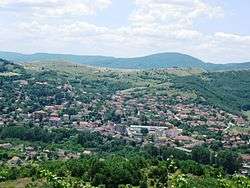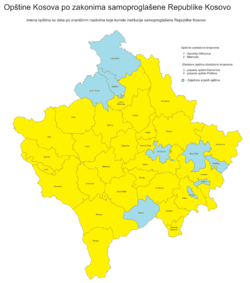Community of Serb Municipalities, Kosovo
| Zajednica srpskih opština | |
|
Location of the Community of Serb Municipalities within Kosovo. | |
| Formation | TBD |
|---|---|
| Headquarters | North Mitrovica |
| Location | |
Membership |
North Mitrovica Zubin Potok / Zubin Potoku Leposavić / Leposaviq Zvečan / Zveçan Štrpce / Shtërpcë Klokot / Kllokot Gračanica / Graçanicë Novo Brdo / Novobërdë Ranilug / Ranillug |
Official language | Serbian / Albanian |
President | TBD |
Vice-president | TBD |
The Community of Serb Municipalities[1] (Serbian: Заједница српских општина/Zajednica srpskih opština) or Association of Serb Municipalities (Albanian: Asociacioni i komunave serbe) is a planned self-governing association of municipalities with majority Serb population in and region in Kosovo[lower-alpha 1], expected to be created in 2015 but indefinitely postponed over conflicts about extent of powers.
The creation of the association came as a result of the 2013 Brussels Agreement signed by the governments of Kosovo and Serbia.
In accordance with the competences given by the European Charter of Local Self Government and Kosovo law, the participating municipalities shall be entitled to cooperate in exercising their powers collectively through the association. The association will have full overview of the areas of economic development, education, health, urban and rural planning.
History
There has been a Community called Association of Serb Municipalities and Settlements of Kosovo and Metohija (Zajednica srpskih opština i naselja Kosova i Metohije), founded in February 2003 in Mitrovica, as an association of Serb majority municipalities in Kosovo. It was considered illegitimate by the Government of Kosovo, as it exercised legislative and executive authority over its territory, mostly in North Kosovo, through its Assembly.
In 2005, part of the Serbia-Kosovo negotiation was the Serbian side's call for the establishment of Serb municipalities and constitutional and legal protection of Serbs.[2] UN Special Representative (UNOSEK) Jessen-Petersen and Kosovo speaker Daci reiterated the ruling out of partition.[2]
In accordance to the Brussels Agreement however, the new Association of Serbian municipalities and its Assembly holds no legislative authority any more, having only a "full overview power in the areas of economic development, education, health, urban and rural planning" in accordance with the European Charter of Local Self-Government and Kosovo law.
The Gorani people have stated that they want Gora (a former municipality with Gorani majority that was merged with the Albanian-inhabited Opolje to form the Dragaš municipality which has an Albanian majority) to join the Community of Serb municipalities. On 3 November 2013 70% voted in favour of establishing the Gora municipality as part of the Community of Serb municipalities, according to Gorani political leader Safet Kuši.[3]
Formation
Its formation is predicted by the Brussels Agreement between Belgrade and Pristina.[4] This agreement represents an important step in process of accession of Serbia to the European Union.[5] By this agreement, it was also agreed that Serbia will not block accession of Kosovo to the European Union and vice versa.[4] This agreement was also praised by UN Secretary-General Ban Ki-moon who said that it guarantees broad powers to municipalities with Serb majority in Kosovo.[6] The Community includes these municipalities: North Kosovska Mitrovica, Zubin Potok, Leposavić, Zvečan, Štrpce, Klokot-Vrbovac, Gračanica, Novo Brdo, Ranilug and Parteš. In one interview for Radio Television of Kosovo, Prime Minister of Kosovo Hashim Thaçi said that the establishment of an Association of Serb municipalities is in essence acceptable by the Constitution of Kosovo and Ahtisaari Plan, while the AAK party leader Ramush Haradinaj supported this by saying that the Constitution of Kosovo allows the association of municipalities, but without holding legislative, judicial or executive power.[7] In November 2014, Ljubomir Marić, one of the co-ordinators with the duty of establishing the Community of Serb Municipalities stated that it would be based on the South Tyrol model in Italy and that he expected to establish two more Serb municipalities in Gora and Prilužje.[8]
Municipalities
The association would include these municipalities: North Kosovska Mitrovica, Zubin Potok, Leposavić, Zvečan, Štrpce, Klokot, Gračanica, Novo Brdo, Ranilug and Parteš. The correct number of the population is unknown, due to the boycott by north municipalities in the 2011 Kosovo census. However, the population ranges between 70-120,000 people (by estimates).
Demographics
There are seven municipalities in Kosovo with an ethnic Serb majority. The Albanian population in these municipalities ranged between 30-50%, with a majority in Novo Brdo, Štrpce and Klokot, and over 20% in Gračanica. However, after the independence declared in 2008 and the crisis in North Kosovo (2011-13), the Albanian population in the area moved to other Albanian-majority cities such as in Mitrovica and others, leaving an absolute majority Serb population in the northern cities. Other ethnic groups include Bosniaks, Gorani, Roma and others.
ECMI "calls for caution when referring to the 2011 census", due to the boycott by Serb-majority municipalities in North Kosovo and the partial boycott by Serb and Roma in southern Kosovo.[9]
| Municipalities | Serbs | Albanians | Other | Total | Reference | |||
|---|---|---|---|---|---|---|---|---|
| Number | % | Number | % | Number | % | |||
| Gračanica/Graçanica | 7,209 | 67.7 | 2,474 | 23.2 | 973 | 9.1 | 10,656 | 2011 Census |
| Klokot/Kllokot | 1,362 | 43.2 | 1,775 | 56.3 | 17 | 0.5 | 3,154 | 2011 Census[10] |
| Leposavić/Leposaviq | 18,000 | 96.3 | 300 | 1.6 | 400 | 2.1 | 18,700 | Estimate (OSCE)[11] |
| Novo Brdo/Artanë | 3,112 | 46.4 | 3,524 | 52.4 | 83 | 1.2 | 6,729 | 2011 Census |
| North Mitrovica | 22,530 | 76.6 | 4,900 | 16.6 | 2,000 | 6.8 | 29,430 | Estimate (OSCE)[12] |
| Parteš/Partesh | 1,785 | 99.9 | 0 | 0 | 2 | 0.1 | 1,787 | 2011 Census[13] |
| Ranilug/Ranillug | 3,692 | 95.5 | 164 | 4.2 | 10 | 0.3 | 3,886 | 2011 Census |
| Štrpce/Shtërpcë | 3,148 | 46.5 | 3,575 | 52.8 | 44 | 0.7 | 6,767 | 2011 Census[14] |
| Zubin Potok | 13,900 | 93.3 | 1,000 | 6.7 | 14,900 | Estimate (OSCE)[15] | ||
| Zvečan/Zveçan | 16,000 | 96.1 | 350 | 2.1 | 300 | 1.8 | 16,650 | Estimate (OSCE)[16] |
| Community of Serb municipalities | 91,161 | 80.9 | 17,649 | 15.7 | 3,829 | 3.4 | 112,639 | |
| | |||||||||
|---|---|---|---|---|---|---|---|---|---|
| Rank | District | Pop. | |||||||
 North Mitrovica Leposavić |
1 | North Mitrovica | District of Mitrovica | 22,000 |  Zvečan Gračanica, Kosovo | ||||
| 2 | Leposavić | District of Mitrovica | 20,600 | ||||||
| 3 | Zvečan | District of Mitrovica | 17,000 | ||||||
| 4 | Gračanica, Kosovo | District of Pristina | 11,006 | ||||||
| 5 | Zubin Potok | District of Mitrovica | 8,479 | ||||||
| 6 | Štrpce | District of Ferizaj | 6,913 | ||||||
| 7 | Novo Brdo | District of Pristina | 6,720 | ||||||
| 8 | Ranilug | District of Pristina | 3,785 | ||||||
| 9 | Parteš | District of Gjilan | 2,865 | ||||||
| 10 | Klokot | District of Gjilan | 2,556 | ||||||
Criticisms
Criticisms in the Albanian community
The Brussels agreement between Belgrade and Pristina was criticized by representatives of Albanians in south Serbia as they believe that the Brussels agreement gives Serbs in Kosovo autonomy, and thus warrants a similar level of autonomy for the three Serbian municipalities, in Serbia proper, which have an Albanian majority.[17][18] The radical Albanian nationalist party Vetëvendosje! has also staged violent protests against the agreement, as they believe that an autonomous Serb region within Kosovo would cripple the country's sovereignty and cement ethnic partition.[19]
Criticisms in the Serbian community
The Brussels agreement has been criticized by the Democratic Party of Serbia which argued that it makes no mention of Serbia or its Constitution and laws, or UN Security Council Resolution 1244, while it does mention the Kosovo Constitution and laws, and therefore demanded a referendum on it.[20] The Serbian Orthodox Church has called the agreement "a complete withdrawal of Serbia's institutions from the territory of its southern province and setting up limited autonomy of the Serb community in the area to the north of the Ibar bridge in Mitrovica within Hashim Thaçi's establishment".[21] Serbs in Northern Kosovo have also rallied against the agreement, and in support of the Assembly's continued rule in the Serb-majority municipalities.[22]
See also
- North Kosovo
- Joint Council of Municipalities (in Croatia)
- Alliance of Serb municipalities (in Federation of Bosnia and Herzegovina)
- Assembly of the Community of Serbian municipalities
- Brussels Agreement
- Serbs in Kosovo
Notes and references
Notes
- ↑ Kosovo is the subject of a territorial dispute between the Republic of Kosovo and the Republic of Serbia. The Republic of Kosovo unilaterally declared independence on 17 February 2008, but Serbia continues to claim it as part of its own sovereign territory. The two governments began to normalise relations in 2013, as part of the Brussels Agreement. Kosovo has received recognition as an independent state from 110 out of 193 United Nations member states.
References
- ↑ "Community of Serb Municipalities in Kosovo to be formed | InSerbia News". Inserbia.info. Retrieved 2015-10-30.
- 1 2 Niels van Willigen (18 July 2013). Peacebuilding and International Administration: The Cases of Bosnia and Herzegovina and Kosovo. Routledge. pp. 177–. ISBN 978-1-134-11718-5.
- ↑ "Goranci: Ne želimo u Dragaš već u Zajednicu srpskih opština" (in Serbian). Blic. 2013-11-08.
- ↑ "Odluka iz brisela". Heinrich Böll Foundation. 2013. Retrieved 2013-10-14.
- ↑ "Danas sjednica Vijeća sigurnosti o Kosovu". Al Jazeera Balkans. 2013. Retrieved 2013-10-14.
- ↑ "South Tyrol model for Serb municipalities". B92. 10 November 2014. Retrieved 10 November 2014.
- ↑ "ECMI: Minority figures in Kosovo census to be used with reservations". ECMI. Retrieved 2015-10-30.
- ↑ "Minority Communities in the 2011 Kosovo Census Results : Analysis and Recommendations" (PDF). Ecmikosovo.org. Archived from the original (PDF) on 2014-01-03. Retrieved 2015-10-30.
- ↑ "OSCE Leposavic estimates". OSCE. Retrieved 2015-10-30.
- ↑ "OSCE Mitrovica North estimate". OSCE. Retrieved 2015-10-30.
- ↑ "OSCE - Partes (2011 Census)". OSCE. Retrieved 2015-10-30.
- ↑ "Municipal Profile" (PDF). Osce.org. September 2015. Retrieved 2015-10-30.
- ↑ "OSCE Zubin Potok estimate". OSCE. Retrieved 2015-10-30.
- ↑ "OSCE Zvecan estimates". OSCE. Retrieved 2015-10-30.
- ↑ "Albanci iz Doline" (in Serbian). Peščanik. 8 June 2013. Retrieved 14 October 2013.
- ↑ "South Serbia Albanians Seek Community of Municipalities". Balkan Insight. 2013-05-03. Retrieved 2015-10-30.
- ↑ Bytyci, Fatos (2013-06-27). "Protesters fight police as Kosovo approves Serbia deal". Reuters. Retrieved 2015-10-30.
- ↑ "DSS demands referendum and resignations". B92. 23 April 2013. Retrieved 10 December 2013.
- ↑ "Church criticizes Brussels agreement". B92. 22 April 2013. Retrieved 10 December 2013.
- ↑ "Serbs in north say no to Kosovo agreement". B92. 22 April 2013. Retrieved 10 December 2013.
